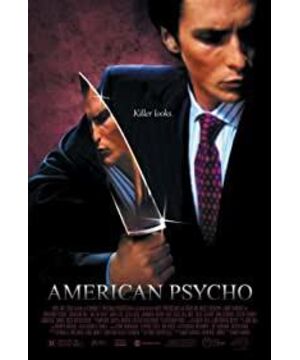The book also mentions that the protagonist in "William Lovell" also takes boredom and transgression as the main perspective of the world. From the perspective of the age, in "American Psychiatric", bloody scenes of murder and abuse are necessary. The reason is that, by today's standards, William's crime is too calm.
The first sentence of "American Mental Ill" is "Those who come here, give up all your hopes"-this is the commandment on the gate of hell in the third poem of Dante's "Divine Comedy". The last sentence of the novel is "This is not an exit", and the whole story is framed by these two sentences. Just as Bateman soberly realized that "my life is hell", but when he pointed this out, no one had ever understood it.
In the novel, one of the several plots that gave Bateman a strong emotional shock is that an acquaintance has a more beautiful business card than him. In Bateman's world, everyone is the same. They are rich and tidy, and have an elegant appearance. Just because everything looks the same, any difference, no matter how insignificant it appears to the reader, is vital to Bateman. For example, when he saw two different trademarks of mineral water, he was so excited that he couldn't control himself.
God is dead; the world is meaningless; justice is dead; sex is completely quantified and reduced to a question of money and quantity. This is Bateman's world. The dependence on fashion shows the vagueness of self-personality, that is, one cannot distinguish oneself from others, and this surface has no depth at all. In such a world, how can one seek meaning? Bateman's answer is: push it to the extreme, and then cross the boundary; cross all imaginable and unimaginable boundaries, so as to create differences and break the uniformity. By walking in a pool of blood and taking out other people's internal organs, he felt that he could indeed grasp certain truths. The reality flashed by in front of him, and the reader was totally unsure of what Bateman’s real behavior was and what was merely his imagination, because there was no criterion for judging other than his own solipsistic reality, “This is the world. , The way my world works". Such solipsism is completely consistent with traditional existentialism, and is completely in line with the use of terms such as "anxiety", "terror", and "disgusting". Especially anxiety plays a central role in "American Psychiatric". On many occasions, Bateman mentioned a kind of "unknown terror" and talked about various forms of terror to his secretary, but did not go further. This horror has almost no metaphysical depth, and Bateman’s evil may be derived from this horrible feeling.
Bateman is a lonely person in the world, completely isolated from the world except for extremely general interpersonal communication, his life is unimaginably boring. Bateman's existential exile and life in a completely unreal world made it impossible for him to sympathize with anyone and squeezed all of his humanity. In fact, Bateman has a certain degree of self-knowledge. He realizes that he has no connotation, but insists that it is impossible to understand himself more deeply. However, this impossibility did not come from desperate boredom, but he had no thoughts to understand. No rational analysis can tell him who he is. The reason is: "there is no answer." This insurmountable boredom is compensated by perverted evil.
"American Psychiatric" lacks a true narrative structure, but consists of a series of individual events. This reflects Bateman's broken perception of self. The lack of a true history that connects the past and the future makes Bateman have to seek personal identity anytime and anywhere. The coherent experience is premised on the narrative dimension, but Bateman is unable to transform the surrounding events into a coherent narrative. He can provide the reader with nothing except a bunch of information.
Such an abstract and personalized process cannot provide substantial meaning to life. People need a purpose related to infinity. Spiritually, we have similarities with Bateman, but have some abilities that he lacks-the ability to create purely symbolic expressions to express dissatisfaction with civilization, and the ability to recognize key boundaries outside of ourselves. It is these abilities that keep romanticism and barbarism a step away. Why should we observe such boundaries? We can give a pragmatic answer: otherwise it will be worse.
In many ways, Bateman is a classic existential hero. The typical slogan of existentialism is: only personal life is valuable and can create value. Because these values are determined purely by individuals, they are also completely arbitrary. Neither can we seek the necessary meaning from ourselves, we find this meaning in the outside world—for example, fashion. But we are also soberly aware that these will not last long. In order to overcome this shortcoming, we are always looking for new things.
Most people are facing such a crisis of meaning. Create meaningful illusions and look for identity on things that are fleeting, so this identity is also short-lived. The original intention of the modern liberation movement is to liberate individuality, but the result is the annihilation of human nature. Our life is exactly like traveling. Bowman: This world is the territory of travelers, this world is for people to enjoy, and enjoyment gives this world meaning. In most cases, aesthetic meaning is the only meaning needed and the only meaning that can be endured. However, with this process—all aesthetics liberating all people from the shackles of tradition—the whole world spreads, leaving less and less space for non-aesthetic characteristics, and the world gradually loses its meaning.
-"Boring Philosophy"
View more about American Psycho reviews











